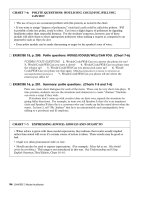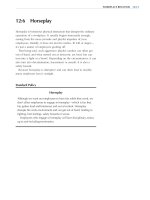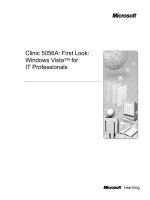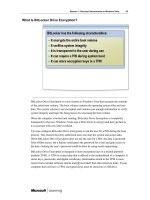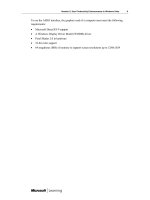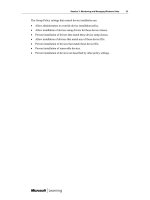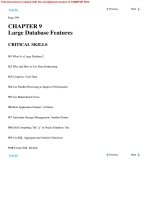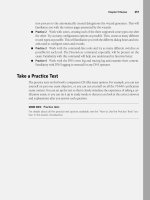Windows Vista Power users guide phần 6 doc
Bạn đang xem bản rút gọn của tài liệu. Xem và tải ngay bản đầy đủ của tài liệu tại đây (326.6 KB, 11 trang )
Windows Vista – Power users guide Page 56 of 66
Written by Mike Halsey,
www.TheLongClimb.com, Copyright © 2007, 2008
APPENDIX A
GLOSSARY
32 BIT
An older type of computer processor
capable of processing up to 32 bits of
binary data (0 or 1) at a time. They
can handle up to 4Gb of installed
memory.
64 BIT
Much newer processor designs
capable of handling 64 binary bits at a
time and memory in excess of 4Gb.
They offer significant stability and
security benefits over 32 bit
processors.
ADMINISTRATOR
The user mode in which software has
full access to change / delete anything
on your computer. Windows Vista by
default runs in a Standard User mode
to improve security.
ADSL
The most common type of broadband
internet access. Asynchronous Digital
Subscriber Line is the access provided
by British Telecom and all other non-
cable or satellite internet access
providers.
AGP
An interface for graphics cards on a
PC, has since been replaced by PCI-
Express (PCI-E).
BOOTING
Starting up your computer to use
Windows.
Windows Vista – Power users guide Page 57 of 66
Written by Mike Halsey,
www.TheLongClimb.com, Copyright © 2007, 2008
DEFRAGMENT
Files on your hard drive can become
fragmented over time. This means
that Windows looks for the next best
place to save your file. However as
you delete files this space might not
be big enough for it. So it splits the
file over the available free space.
Over time this can slow your PC down
and cause your files to become
corrupt.
Defragmenting your drive brings all
the pieces of your files back together
again.
Fragmented Files
F i F l i
2 l e e 1
Defragmented Files
F i l e 1 F i l e 2
DEP
Data Execution Prevention, a feature
introduced in Windows XP Service
Pack 2 to stop viruses. It can also
prevent some games from running.
DRIVE LETTERS
Typically C: or A:, these are traditional
ways to refer to the hard drives and
removable storage in your PC.
DRIVER
Software that tells Windows how to
communicate with installed hardware.
DUAL BOOTING
Running more than one operating on
your PC. For instance having both
Windows XP and Windows Vista
installed and choosing when you
switch the computer on, which one to
boot into.
DX10
DirectX 10 is the new 3D graphics
engine for Windows Vista, it enables
new effects in PC games.
GB
Gigabyte, A unit of measure. 1Gb =
1000Mb. 1Gb is typically enough
space on a hard disk to store 200
MP3s or enough memory to allow
Windows Vista to run properly.
HARD DRIVE / HARD DISK
A physical disk that sits inside your PC
on which you store files and data. If
you do not have much memory,
Windows creates a virtual memory
file, called a swap file, that acts as
memory but sits on the hard drive.
Reading and writing to a hard disk is
slower than reading and writing to
memory. Hard disks are measured in
Gb units.
ICAL
See WebDav, also the calendar
program for Apple computers.
Windows Vista – Power users guide Page 58 of 66
Written by Mike Halsey,
www.TheLongClimb.com, Copyright © 2007, 2008
MB
Megabyte, A unit of measure. 1Mb is
approximately the amount of storage
you can fit on a floppy disk. To
compare, a CD will store
approximately 650Mb and a DVD will
store 4.5Gb.
MEMORY
Temporary storage for files and
programmes while your computer is
running. The more memory your
computer has, typically between
512Mb and 2Gb, the faster it can run
because the less reading of the hard
disk is required. Reading and writing
to memory is faster than to a hard
disk. Memory is measured in either
Mb or Gb units.
OPERATING SYSTEM
Aka: Windows Vista. The software
that acts as an interface for your
computer and that allows you to run
software.
NETWORKING
Connecting your computer to a
network of others, either in your
home or onwards to the internet.
PARTITION
Your hard drive can be split into
separate partitions. Each of these
becomes its own hard drive in the
available space. For instance a 400Gb
hard drive can be split into a 100Gb
partition followed by two 250Gb
partitions. This is useful for keeping
your data and files away from your
Windows installation.
PCI-E
PCI Express, the new format for
graphics cards on a PC, replacing the
older AGP standard.
Adobe’s Portable Document Format is
an excellent way to transfer
documents between people, being
operating system independent.
PHISHING
Emails that purport to be from Banks
or websites such as Amazon or eBay
that try and trick you into logging in to
what you think is a genuine site to get
your passwords and other details.
READYBOOST
A way of increasing the amount of
memory in Windows Vista by plugging
in a compatible USB pen drive.
REMOTE ASSIST
A feature in Windows that allows
remote control of your PC over the
internet when you give permission, so
that someone not in front of your PC
can solve problems on it.
REMOTE DESKTOP
Remote control of other PCs in your
home or office.
SAVED SEARCHES /
VIRTUAL FOLDERS
A search that you can save as a folder
and that can be treated in the same
way, but that holds no actual files and
Windows Vista – Power users guide Page 59 of 66
Written by Mike Halsey,
www.TheLongClimb.com, Copyright © 2007, 2008
dynamically updates whenever it’s
opened.
SHADOW COPIES /
PREVIOUS VERSIONS
Automatic backup of previous
versions of files performed by
Windows Vista. These previous copies
of files can be restored by right
clicking on the file and selecting its
properties.
SPAM
Unwanted, unsolicited email. Named
after a pre-cooked tinned meat
commonly eaten in the UK during the
Second World War, and usually
despised by all who ate it.
SPYWARE
Unwanted files that collect on your PC
as you browse the internet. Many are
innocuous but some can have
malicious purposes. They are
removed by software such as
Windows Defender.
SYSTEM RESTORE
A feature that takes a snapshot of
your PC’s operating system at certain
periods so you can restore the system
to that point in the event of a
problem.
TAGS
Key words to describe the contents of
your files or photographs.
TASKBAR
The bar that typically runs along the
bottom of your screen containing the
Windows Orb Button, icons and the
clock.
UAC
User Account Control (UAC) is the
security system in Windows Vista to
guard against virus and other attack.
UI
User Interface, a term to describe the
look and feel of an application or
Operating System.
USERS FOLDER
The location where your Documents
and other personal files are stored.
This can be moved away from the
drive or partition on which you have
installed Windows Vista.
VIRTUAL MEMORY
Additional memory kept as a hidden
file on your hard drive for when you
run out of physical memory. This is
much slower than physical memory.
WEBDAV
A way to store calendars online so
that they can be shared with other
people.
Windows Vista – Power users guide Page 60 of 66
Written by Mike Halsey,
www.TheLongClimb.com, Copyright © 2007, 2008
WI-FI
Wireless internet access, also called
802.11. There are four speeds a, b, g
and n with a being the slowest, n
being the fastest and g currently being
the most common.
WINDOWS KEY / ORB
The key between CTRL and ALT at the
bottom left of your keyboard, also
known as the Windows Orb (formerly
the Start Button) on the taskbar.
WINDOWS UPDATE /
MICROSOFT UPDATE
A utility built into all versions of
Windows to help keep the operating
system up to date and free from
security holes.
XPS
Microsoft’s answer to Adobe’s PDF
format, the Cross Platform Support
document format offers the same
advantages that PDFs offer but is
relatively new.
Windows Vista – Power users guide Page 61 of 66
Written by Mike Halsey,
www.TheLongClimb.com, Copyright © 2007, 2008
APPENDIX B
THE AUTHOR
ABOUT MIKE HALSEY
Mike Halsey grew up in Camberley,
Surrey (UK). He is currently based in
Sheffield.
Mike has been working in IT Support
for years. He began supporting
individuals in their homes and micro-
businesses and moved on to blue-chip
clients including major UK banks
NatWest and Royal Bank of Scotland
and the supermarket chain Tesco. He
has been a beta-tester for Microsoft
for a few years now.
Before that Mike spent several years’
self-employed providing websites,
adverts and other promotional
materials for micro-business and SMEs
in the UK and as far afield as
Amsterdam and China.
He is now working as a teacher for a
national training charity teaching
English, Mathematics and,
unsurprisingly, IT.
He is a keen photographer with a
particular interest in modern
architecture. His photographic site is
at
www.TheLongClimb.com.
Windows Vista – Power users guide Page 62 of 66
Written by Mike Halsey,
www.TheLongClimb.com, Copyright © 2007, 2008
APPENDIX C
OFFICE 2007
INTRODUCTION
Microsoft Office 2007 is nothing short
of a revolution in the way we use
office software. However the new
Ribbon interface and some of the
options we’re used to being able to
find easily can appear hidden away at
first.
THE RIBBON
Gone are the menus in almost every
office application to be replaced by
the Ribbon. An intuitive, context
sensitive bar across the top of your
screen that contains all the commands
you will need for any particular task.
The Ribbon may seem confusing at
first but it’s worth spending some
time working with as it’s a far better
way of working with office
applications.
WHY THE RIBBON?
The ribbon came about because
feedback given to Microsoft on new
features customers wanted in Office
were usually things that the software
was already capable of doing.
Previous versions of Office
automatically ‘hid’ features that
weren’t used for a while. The
software also allowed people to
completely ‘lose’ toolbars and even
the main menu.
Windows Vista – Power users guide Page 63 of 66
Written by Mike Halsey,
www.TheLongClimb.com, Copyright © 2007, 2008
MINIMISING THE RIBBON
If you need more space on your
screen, you can Right Click anywhere
in a blank area of the Ribbon and
select Minimise the Ribbon. You can
restore it the same way.
When minimised, the Ribbon will only
appear when you click on a tab and /
or hover over it.
CUSTOMISE THE RIBBON
The Ribbon itself is not customisable,
in that it was designed to not need it.
However there is software available
that will let you customise it and add
new tabs of your own including
Ribbon Customizer
from
pschmid.net/office2007/customi
ze.
FIND OFFICE 2000 / XP /
2003 COMMANDS
If you get stuck in the first few days of
using the Ribbon, Microsoft have a
handy interactive guide on-line where
you can select the command you want
in the previous Office menu system
and it will show you where the
command is on the new Ribbon.
You can find the Find Familiar
Commands in the New Ribbon
at
office.microsoft.com/en-
gb/getstarted/FX101938921033.aspx.
USE THE
ORB
The Office
Orb, located
in the top
right of each
Windows in
most
applications
is the
replacement
for the old
File menu.
THE START ORB
The new Start Orb
in the top right of
most applications is
the replacement for
the File menu. It is
here that you can
open and save files and change
options.
QUICK ACCESS TOOLBAR
You can add commands you use
commonly to the quick access toolbar
by clicking the down arrow to the
right of the icons there.
If you want to add a lot of commands
to the quick access toolbar you can
move it easily below the Ribbon.
LIVE PREVIEW
One of the coolest new features in
Office 2007 is Live Preview. When
selecting something in the Ribbon that
will change the formatting of your
document, hovering over the item will
change your document so you can see
how the change will look should you
implement it. The change won’t take
place however until you actually click
the Ribbon item.
OPTIONS IN OFFICE
You’ll see that Office 2007 as standard
is a blue colour. Many people don’t
like this very much. Pressing the Start
Windows Vista – Power users guide Page 64 of 66
Written by Mike Halsey,
www.TheLongClimb.com, Copyright © 2007, 2008
Orb and selecting [Word / Excel ]
Options will allow you to change the
Colour Scheme to silver or black as
suits your tastes.
SAVE AS
The Save section in Options allows
you to change the standard Save
options for Office.
With Office 2007, Microsoft have
introduced new file formats that are
more robust and resilient than
previous versions. The new *.docx
and *xlsx formats cannot be read in
previous versions of Office without a
compatibility pack, which can be
downloaded
from
office.microsoft.com/en-
us/products/HA101686761033.aspx.
SAVE AS PDF?
In the Save As options from the
Start Orb is a facility to go online to
find more file formats you can save
your documents as. These include
Adobe PDF format. This is an
extremely useful and free plug-in from
Microsoft.
ENGLISH SPELLING
By default the language settings in
Office 2007 and the spell-checker are
US English. You can change this in
Language Settings located in the
Options from the Start Orb.
OPTIONS
Use the
options in
the Start Orb
to change
the default
spell-checker
language and
colour of
Office
applications.
Windows Vista – Power users guide Page 65 of 66
Written by Mike Halsey,
www.TheLongClimb.com, Copyright © 2007, 2008
APPENDIX D
DOCUMENT
VERSION HISTORY
18
TH
FEBRUARY 2007
First draft of the document
25
TH
FEBRUARY 2007
Second Edition - Complete update
with many new sections and complete
change of format.
13
TH
MARCH 2007
Part 3 – Exploring - Added Previewing
files, Renaming Files (Quick Hint)
Part 6 – Playing – Added Support for
Games
Part 8 – Guaranteeing - Added
Complete PC Backup
Part 10 – Diagnosing - Added
MSConfig, System File Checker, I can’t
access my files / IE Favourites,
Windows Calendar has stopped
working, Internet Explorer is
Malfunctioning
Part 11 – Tweaking - Added IE7
tweaks, Add your own Wallpaper
Appendix B – Added About the Author
Appendix D - Added Document
version history
24
TH
MARCH 2007
Part 1 – Installing – Updated Vista
Upgrade Edition
Part 3 - Exploring – Updated
Previewing files
Windows Vista – Power users guide Page 66 of 66
Written by Mike Halsey,
www.TheLongClimb.com, Copyright © 2007, 2008
Part 10 – Diagnosing – Updated
Windows Calendar has stopped
working
Part 11 – Tweaking – Added
Previewing PDF Files in Explorer, How
to create icons without text
7
TH
APRIL 2007
Part 3 – Exploring – Added
Remembering Window Sizes
Part 10 – Diagnosing - Added Gaming
problems in Vista
